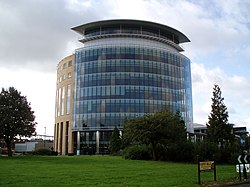Top Qs
Timeline
Chat
Perspective
Ubisoft Reflections
British video game developer From Wikipedia, the free encyclopedia
Remove ads
Ubisoft Reflections Limited (formerly Reflections and later Reflections Interactive Limited) is a British video game developer and a studio of Ubisoft based in Newcastle upon Tyne. Founded in 1984 by Martin Edmondson and Nicholas Chamberlain, the studio focuses on racing games and it is best known for creating the award-winning Driver series. Reflections was acquired by GT Interactive in 1998 – which later turned into Atari Inc. – and sold to Ubisoft in 2006. The company worked in close cooperation with sister studio Ubisoft Leamington, until its closure in 2025.
Remove ads
History
Summarize
Perspective
Martin Edmondson and Nicholas Chamberlain started developing games for the BBC Micro under the moniker "Reflections" in 1984.[2] Their first game was a Paperboy clone called Paper-Round that took two years to develop but was never released.[3] While working on that game, they started Ravenskull which would be their first published game, released in 1986 by Superior Software. This was followed by Codename: Droid and an Acorn Electron conversion of Stryker's Run in 1987.[3]
The name Reflections was first used for their 1989 hit Amiga game, Shadow of the Beast, published by Psygnosis which spawned two sequels. The original Amiga game was partially written by Paul Howarth,[4] and started out life as a parallax test of the blitter of the Amiga's Agnus chip; Paul later went on to work for Deep Red Games, a UK video game company based in Milton Keynes. A number of other Amiga and Atari ST games followed including Ballistix (1989), Awesome (1990) and Brian the Lion (1994). In 1995, they became known for Destruction Derby, which was critically acclaimed for its realistic physics and destruction, which later become Reflections' specialty. Due to the success, the game had four more sequels over the years.
On 9 January 1999, it was announced that Reflections had been acquired by GT Interactive in 1998, for a reported 2.7 million shares of common stock, which was valued at around US$14.17 million.[5][6] Reflections became well known for the game Driver, which was inspired by '70s cop shows like Starsky and Hutch and movies like Bullitt and The Driver. It has been followed by four sequels and four spin-offs. The company was subsequently renamed Reflections Interactive.
In 2004, studio founder Martin Edmondson left Reflections after the concepting stage of Driver: Parallel Lines, and sued Atari due to "constructive unfair dismissal as a result of Reflections alleged repudiatory breach of a contract of employment that necessitated Mr. Edmondson's resignation."[7] Martin's brother, Gareth Edmondson, took his place as the studio manager. In July 2006, Atari announced that it had transferred all of the staff and most of the assets of Reflections Interactive Limited, including the intellectual property and technology rights to the Driver series, to Ubisoft for US$24 million.[8]
Studio manager Gareth Edmondson, left Reflections after more than a ten-year presence at the studio in November 2011, two months after the launch of Driver: San Francisco.[9] It was announced in February 2013, that Pauline Jacquey had been hired as new managing director.[10]
In May 2013, Ubisoft Reflections announced that it was working on a new game, and that Ubisoft planned to announce the game at E3 2013.[11] On 10 June 2013, during Ubisoft's press conference, it was revealed that Reflections was working with developer Ivory Tower on the racing game The Crew.[12]
Reflections then started to take on more support work for other developers' games. In February 2014, it was announced that the studio would assist Ubisoft Massive in the development of Tom Clancy's The Division.[13] Watch Dogs, released in May 2014, from Ubisoft's Montreal and Toronto studios, began life as a new entry in the Driver series before becoming an original IP. Reflections provided development support, handling the game's driving missions, among other elements. The studio returned for the 2016 sequel.[14]
In 2015, Reflections released Grow Home, a procedurally animated climbing game originally developed as a side project by members of the team.[15] A sequel, Grow Up, was released in 2016.[16]
In January 2017, with the acquisition of FreeStyle Games, Richard Blenkinsop was named managing director of Reflections and the newly renamed Ubisoft Leamington.[17] In March 2018, it was announced that Reflections, and six other studios, would work on The Division 2.[18]
In February 2020, following the studio's transition to a support team, Reflections reported a 10% in revenue.[19] In July, the studio expanded to a third floor at its headquarters in Partnership House.[20] That September, Ubisoft announced that Red Storm and Reflections would be working on Oculus VR games based on its Assassin's Creed and Splinter Cell franchises.[21][22] However, the Splinter Cell VR game was later cancelled in 2022.[23] Assassin's Creed Nexus VR was released in November 2023.[24]
Blenkinsop retired in 2021 and was replaced by Lisa Opie as managing director of both studios that May.[25]
In January 2025, Ubisoft Reflections was downsized. At the same time, the Leamington office, which Reflections frequently collaborated with, was closed. When combined with layoffs in Düsseldorf and Stockholm, 185 employees were affected.[26]
Remove ads
Games developed
Remove ads
References
External links
Wikiwand - on
Seamless Wikipedia browsing. On steroids.
Remove ads


